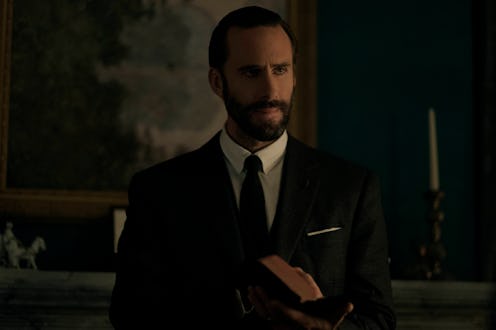
For as many strides as we've taken to condemn sexual violence, there lingers a prevalent tendency to normalize, dilute, and excuse it. Sexually explicit jokes aren't cast as threatening, but instead deemed harmless "locker room talk"; a woman isn't a victim of abuse, she was "asking for it"; and rape isn't always rape, but a mistake, a misunderstanding, or a drunken lapse in judgment. In The Handmaid's Tale, Commander Fred is a human conglomeration of all of these such problems — the living embodiment of the rape culture we've been fighting so hard to stifle. He doesn't ask for permission, he grants it; he praises women in public, then degrades them in private; and he rests on power, manipulation, and fear to feed his patriarchal desire.
When The Handmaid's Tale first premiered in April, writer EJ Dickson wrote for Bustle that the Commander was not unlike some of the left-leaning men who've aligned themselves with the feminist movement — those who benefit from male privilege even as they outwardly condemn it. It's fitting, then, that the Commander is even more pernicious than initially presented.
When viewers first met him, he seemed warm, sympathetic, disarming — even borderline apologetic. He told Offred, his government-issued fertility slave, that he found her ritual rape "impersonal" and began trying to forge some semblance of a bond, ostensibly to lend a small bit of humanity to Gilead's sadistic hell. But as the show pressed on, his well-meaning facade started to wane, wearing down to reveal a man not only complicit in perpetuating patriarchal values, but devising the very hierarchy that breeds them.
Some of the most revealing details arrive in the last episodes of the show's first season. First, when the Commander brings Offred to Jezebel's, an illicit sex club that dismantles Gilead's religious guise and embraces inner deviance. Here, he tells Offred, she can be "free," so long as she uses that freedom to please him with pantomimed consent and feigned delight. And lest you think it's mere delusion, he soon shows his cards: when Offred falsely confirms that her baby is his, he responds, knowingly, that she's "so good at" playing into his egoistic fantasy.
But perhaps the most explicit tell arrives during a moment with his wife, the desperate and spiteful Serena Joy. When she confronts him about his and Offred's clandestine trips to Jezebel's, he immediately deflects the blame toward her. "Control myself?" he sneers. "You brought lust and temptation back into this house on your back, and on your knees. If I have sinned, then you led me to it."
And when she snaps that he can deny it if he wants, but that everyone answers to God, he retorts, chillingly, "and you answer to me," then orders her to her room.
It's a distinct and unnerving nod to the victim-blaming that pervades modern society, and one of the more damning moments that root the Commander in real life. (In another scene, he dismisses another man's abusive behavior as an inconvenient oversight).
Perhaps, in the past, the Commander, too, was a "good person" — we've seen flashes of him as a loving husband, an aspiring father — but it didn't take long for the toxic masculinity of Gilead to push him toward his most primal, misogynistic impulses. We all want to think that, given the chance, we'd be the ones to stand up against immorality, but historically, and statistically, this is rarely true.
Phrases like "boys will be boys" or gendered dress code enforcements may seem minor in scope, but there's a reason rape culture persists even in 2017: they reinforce dangerous, outdated, and deeply entrenched ideas about who shoulders responsibility for sex and assault. The Commander, then, isn't just a fictional character, but a conflation of our past, and a vital, emphatic warning for our present: the more we trivialize rape culture, the more normal — and feasible — a world like Gilead could become.